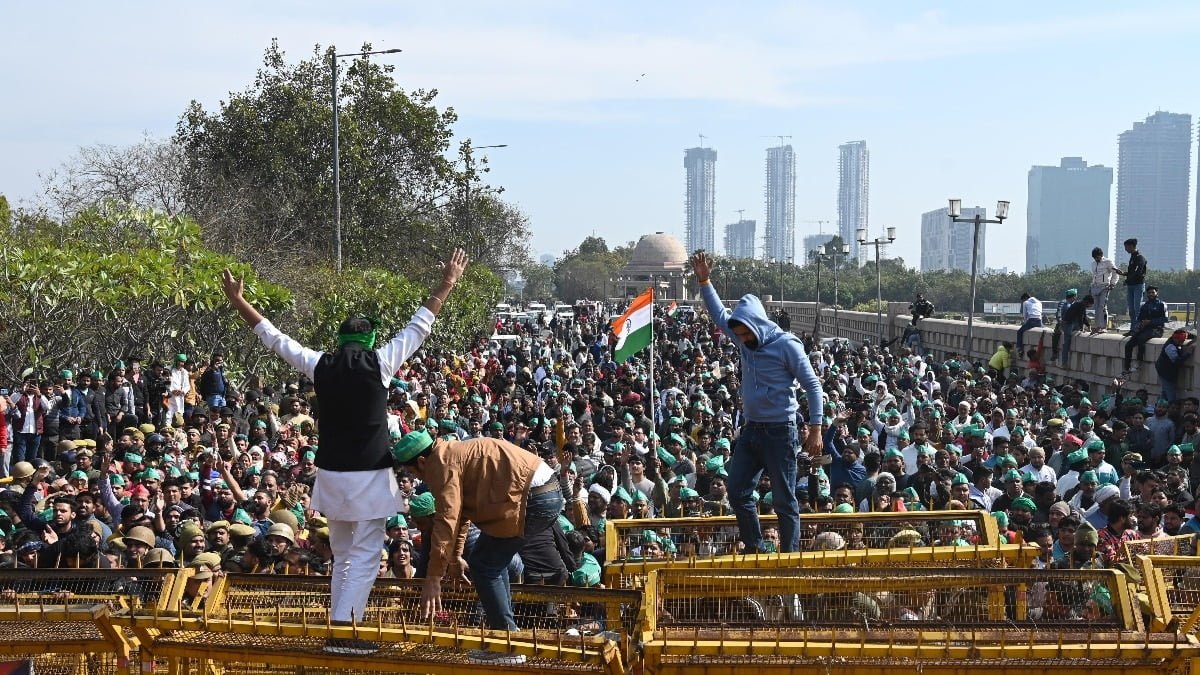Farmers affiliated with the Kisan Mazdoor Morcha (KMM) and the non-political Samyukta Kisan Morcha are set to embark on a journey from various regions of Punjab.
This comes even as security has been tightened in Punjab, Haryana, and Delhi borders ahead of the farmers’ ‘Chalo Delhi’ protest on February 13.
The Union ministers Piyush Goyal, Arjun Munda, and Nityanand Rai will meet the farmer leaders in Chandigarh on February 12 to hold talks with a delegation of the Samyukta Kisan Morcha (Non-Political) and the Kisan Mazdoor Morcha.
The farmers are back on the streets demanding:
- Legislation to ensure Minimum Support Price (MSP) for all crops, aligning with the recommendations of the Dr Swaminathan Commission.
- Implement a comprehensive debt relief program, including a complete waiver of debts for farmers and labourers.
- Reinstate the Land Acquisition Act of 2013 on a national scale, requiring written consent from farmers and providing compensation at four times the collector rate.
- Hold accountable those responsible for the Lakhimpur Kheri massacre and ensure justice for affected farmers.
- Withdraw from the World Trade Organization and halt all free trade agreements to safeguard domestic agriculture.
- Introduce a pension scheme for farmers and agricultural labourers to provide financial security in their later years.
- Offer compensation to the families of farmers who lost their lives during the Delhi agitation and provide employment opportunities to one family member.
- Reject the Electricity Amendment Bill 2020 to protect the interests of farmers and ensure equitable access to electricity.
- Enhance the Mahatma Gandhi National Rural Employment Guarantee Act (MGNREGA) to offer 200 days of employment annually with a daily wage of Rs 700, integrating it with agricultural activities.
- Enforce stringent penalties on companies involved in the production of counterfeit seeds, pesticides, and fertilisers, while improving seed quality standards.
- Establish a national commission dedicated to spices such as chilli, turmeric, and other aromatic crops to support and promote their cultivation.
Sources indicate that after the union government presented to farmers that they had already complied with various demands of farmers. Out of 3300 cases, over 3077 were withdrawn, 98 cases are pending in court and 53 cases are pending withdrawal which amounts to only two percent.
In many cases, compensation has been given but there has been an issue when it comes to next of kin where immediate family relation is not established.
Union Ministers also assured farmers that they will be kept out of the Electricity act. They also said that the government is on the same page as far as the action of fake seeds and fake pesticides are concerned.
However, the main concern remains the MSP. At a time when the Lok Sabha polls are near, neither state nor centre wants to be at loggerheads with the farmers. But there seems to be no middle path- BKU leader Jagjit Singh Dallewal said “Our demands are long pending- and now there cannot be a middle path. But we are willing to meet the government for a second round of talks. The AAP and Congress have already sided with protesting farmers. Punjab Chief Minister Bhagwant Mann accused the Haryana government of creating a border “between Punjab and India”, referring to the concrete blocks, nails, and barbed wire placed on some roads to scuttle the farmers’ proposed ‘Delhi Chalo’ march.
He said the Manohar Khattar-led Haryana government has placed as much barbed wire at the state’s borders with Punjab as there is at the country’s border with Pakistan. Similarly, Congress leader Priyanka Gandhi Vadra on Sunday had Prime Minister Narendra Modi over reports of barricading and laying of nails on roads at certain points near the Delhi border ahead of the farmers’ proposed ‘Delhi Chalo’ march.
According to one assessment, some 20,000 farmers from Punjab and 1500 from Haryana are part of the protests. Chaudhary Dalbir Singh Indoor Stadium in Sirsa, and Guru Gobind Singh Stadium in Dabwali will serve as temporary jails to keep detained farmers. While %0 companies of CAPF have been deployed in Haryana, a senior officer told India Today “While agitating is part of democracy- threatening to block Delhi with tractors and to cause inconvenience is not good.”
But India Today has accessed an internal report on recurring protests in Punjab- mostly done by the farmers who seem to be harming the interest of the state.
Punjab, once a beacon of prosperity and agricultural abundance, now stands on the precipice of economic collapse, haunted by the spectre of recurring protests that have wreaked havoc on its development and stability. The aftermath of the Farmers’ agitation of 2020-21 continues to cast a long shadow over the state, with various organisations claiming to champion farmers’ welfare emerging as opportunistic actors, exacerbating the plight of the very community they purport to serve.
As Punjab struggles to recover from the protracted protests of the past three years, another wave of demonstrations looms on the horizon. Scheduled for February 13, these protests threaten to plunge the state into further turmoil, inflicting untold hardships on the general populace.
Economic development
The economic landscape of Punjab, once characterised by robust growth and prosperity, now bears the scars of prolonged unrest. The state’s Gross State Domestic Product (GSDP) languishes below the national average, with double-digit growth remaining an elusive dream for the past five years.
Persistent revenue deficits, averaging around 70% and reaching alarming levels in recent years, have forced Punjab into a cycle of debt dependency, jeopardising its fiscal health.
